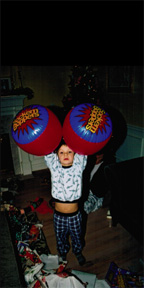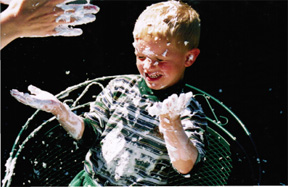by Matthew Lawrence, strategist, Fresh Squeezed Ideas
 As a 42-year-old dad to two young boys, I get excited when they ask for toys bearing the same franchises I loved as a child during the 70’s and 80’s (It seems to be superhero everything, these days!). Providing them these experiences reminds me that I still have some youthful zeal and enthusiasm, which is a great asset in my role as a cultural strategist who works day-to-day at loftier, more adult-natured stuff. But it also reminds me that they are able to enjoy the richest play experiences possible, through tried and true brands that have endured the test of time.
As a 42-year-old dad to two young boys, I get excited when they ask for toys bearing the same franchises I loved as a child during the 70’s and 80’s (It seems to be superhero everything, these days!). Providing them these experiences reminds me that I still have some youthful zeal and enthusiasm, which is a great asset in my role as a cultural strategist who works day-to-day at loftier, more adult-natured stuff. But it also reminds me that they are able to enjoy the richest play experiences possible, through tried and true brands that have endured the test of time.
During moments when I get to participate myself, I can’t help but pause and marvel at the importance of toys. They tell us so much about ourselves–about the boundaries we place around behavior, our fears and desires, our relationships, and our identities. As an anthropologist, I recognize that every decision consumers make is an act of culture: Decisions are based on cultural rules and forces that shape and direct our behavior. I know that the products we buy–toys included–are artifacts of our journey through our lives. My children and the holiday season make me especially aware of the cultural value of toys.
Infinite Youth
We live in a time when a youthful attitude is venerated and is often required for success in the marketplace. Chronological age has been replaced with a need to demonstrate a flexible, open, and childlike spirit. As a result, we tend to seek out brands that reassure us that we are able to maintain youthful value and vitality, and signal that we are prepared to master the challenges of today’s world.
There are many licensed toy properties that activate against this cultural force as parents identify strongly with the nostalgic playthings from their own childhood experiences–skateboards, the board Operation, and Marvel’s super-hero characters are all great examples. These brand choices are validated by the parents’ own experiences and memories, and allow them to continue tapping into the same cultural touch points they always have. In other words, it helps them hold on to that youthful spirit, if only vicariously.
Reconnection to Self
Modern, middle-class families are generally living more robust, well-rounded lives than was possible at any point in human history for the average citizen. Yet often our lives can be so overtaken by intense work and responsibility that it can feel empty, disengaging, and unfulfilling. We can often feel disconnected from the true and meaningful parts of ourselves; those parts that make us feel like ‘real’ ‘authentic’ human beings. The following is a true story as told to me by a colleague:
“My son was a rambunctious child and always a handful for his Mother. He had so much energy that my wife, as a mother of three children, could not keep up. Tension would build in direct proportion to her fatigue as the day progressed, with her having to finally submit herself to a nap; but only after regrettably denying our son the attention he wanted. As summer passed and our son grew frustrated with his mother’s inability to keep playing, she became desperate for relief for fear of damaging their relationship.
 The solution came quite unexpectedly one day. Few children expect their mother to nail them from head to toe in a basketball-sized blob of shaving cream. She wondered, “Which way would this go? Tears? Would he understand it was for fun and not punishment?” After 30 minutes of squealing delight she knew that fun had prevailed–but more importantly, she felt like herself again. For that blissful half-hour, she put the cares and responsibilities of her busy life as a parent aside and indulged in unadulterated reckless abandon. She was a whole person again.”
The solution came quite unexpectedly one day. Few children expect their mother to nail them from head to toe in a basketball-sized blob of shaving cream. She wondered, “Which way would this go? Tears? Would he understand it was for fun and not punishment?” After 30 minutes of squealing delight she knew that fun had prevailed–but more importantly, she felt like herself again. For that blissful half-hour, she put the cares and responsibilities of her busy life as a parent aside and indulged in unadulterated reckless abandon. She was a whole person again.”
The solution in this case was a few cans of cheap shaving cream. Stripped of social roles, toys like water balloons, Silly String, video games, Pictionary, and many other toys help us come back to ourselves, connecting with others as the vibrant, social, and fun beings we are naturally as complete humans.
Historical Authenticity
Another force that toys activate against is that of “historical authenticity.” Contemporary society often feels fake, disingenuous, and disposable. The past seems more real, more durable, and authentic than the lives we live today. Following from this, we look for brands that lean on the idea that “they don’t make them like they used to,” as the saying goes. This notion draws us to products that embody the simple elegance and pure form of a better time.
This force activates against the touchstone of our own authentic youthful experiences. We gain confidence that the same authenticity will be the experience of our kids, making it more meaningful than mere play. As gatekeepers of the wallet, it becomes a compelling reason to believe as we reach for one licensed toy over another–this is the domain of squirt guns (significantly improved in firepower since my youth), Frisbees, Monopoly, and need I mention My Little Pony? (For more on this, see this previous article at Fresh Squeezed Ideas’ web site.)
The Role of Toys for Parents
When we see our children reaching for toys that resonate with our own childhood, it reinforces our sense of good parenting. We are presently inundated with messages that childhood has lost its innocence, and that kids are over-parented, over-structured, over-fed, over-stimulated, over-everything. But the generation like me, raised in the ’70s and ’80s, believes we had a freer, more authentic childhood, loosened from some of the pressures and superficialities that today’s kids face. When our children reach for toys that hearken back to our childhood, it signals that they are somehow participating in a more authentic childhood experience. That makes us feel good.
By tapping into cultural forces, toymakers make the connection between the activity and how it fits into people’s lives. They help us understand what makes one brand successful and another fail to spark the imagination of kids and the motivations of parents as gatekeepers. I hope by sharing this cultural perspective, toymakers can take some pride in the work that they do, which is both noble and necessary for the health of our society. Even when it makes someone wet their pants, it is probably a good thing.
Fresh Squeezed Ideas is a leading foresight, strategy, and innovation consultancy that boasts clients from the Americas, Europe, and Asia. The company’s social scientists, marketing strategists, and communications experts use cutting-edge models around business structures, market behaviors, and social trends to anticipate opportunities, integrate them into clients’ growth plans, and create new points of engagement. More information about FSI’s Cultural Forces can be found at http://culturalforceslab.com/.

